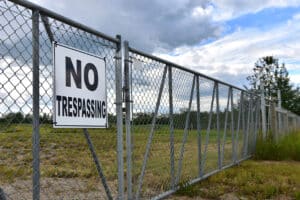
Being arrested for criminal trespass can be a frightening experience, so it’s important to understand your rights. In Pennsylvania, there are three basic levels of criminal trespass charges.
It’s important to understand what they are and what the associated penalties are.
Table of Contents
Criminal Trespass – Felony in The Second Degree

Criminal trespass as a felony in the second degree is the act of breaking into a building or occupied structure knowing that you are not permitted to be there. Breaking into is defined as: “To gain entry by force, breaking, intimidation, unauthorized opening of locks, or through an opening not designed for human access.”
This carries 10 years imprisonment and fines of up to $25,000.
Criminal Trespass – Felony in The Third Degree
To be convicted of criminal trespass as a felony in the third degree, it must be proven that you entered a property or remained inside of any building or occupied property knowing that you didn’t have a right to be there. This carries up to 7 years in prison along with fines of up to $15,000.
Defiant Trespassing – First Degree Misdemeanor
Defiant trespass occurs when an individual enters private property (other than a building or occupied structure) in spite of being warned either personally or via posted notices/fences/property markings.
This is considered a first degree misdemeanor and carries up to 5 years in jail and a $10,000 fine.
Simple Trespass – Summary Offense
Simple trespassing is defined as entering onto a person’s privately owned land with the intent of disturbing them or damaging their premises in any way. Simple trespassing is a summary offense, which may include fines up to $300 dollars along with 90 days in jail.
It would be very unlikely for you to actually receive jail time for a simple trespass charge, but it is possible based on the damage done and your criminal history.
Criminal Trespass vs. Burglary
Criminal trespass and burglary are two related but distinct offenses in Pennsylvania. Understanding the difference between them is important if you want to protect yourself from overly aggressive prosecution.
Burglary involves entering or breaking into a building with the intent to commit a crime therein. This means simply being inside of a property should never be considered burglary; the prosecutor must prove beyond a reasonable doubt that you intended to commit another, separate crime.
This separate crime could be theft, assault, or anything else that is illegal. Burglary is typically considered much more severe than criminal trespass and carries much harsher consequences, including up to 20 years in prison.
Common Defenses to Criminal Trespass
There are certain legal defenses that might apply depending on the facts of your particular case. Some of the most common include the following:
The Building or Structure Was Abandoned
The first defense your lawyer can raise is that the building or structure was abandoned at the time you entered it. If this proves to be true, then you may not be held legally liable for trespassing as no one has exclusive rights over the building anymore since the original owner has deserted it.
The burden of proof lies upon the prosecutor to prove beyond a reasonable doubt that the property owner did not give and would not have given you permission to be on the property. If there is no owner to come testify to this, they won’t be able to prove the case.
Building or Structure Open to The Public
Another legal defense is that the premises were open to the general public and you complied with all conditions required to enter – for example, someone who enters an open store or a subway station.
Defendant Reasonably Believed They Had Permission
Another defense is that you reasonably believed you were licensed or otherwise permitted to be on the premises by either the owner of those premises or someone who had authority over the property.
For example, you were told by a “landlord” that you could enter the property to look around, but it turns out that the person wasn’t actually the landlord and didn’t have permission to allow you onto the property. This could still be used as a defense because it shows that you reasonably believed you had permission to be on the property.
How a Lawyer Can Help With a Criminal Trespass Charge
If you’ve been charged with criminal trespass, it can be both scary and overwhelming. Fortunately, you don’t have to face the situation on your own. Here’s how a lawyer can help:
Investigate – The first step is for your attorney to thoroughly investigate the facts of your case, including gathering evidence from witnesses or reviewing surveillance footage if available.
This helps provide an accurate picture of what happened so they can build an effective defense strategy moving forward
Advocate – Once they know all pertinent details about your case and how best to approach defending it in court, they will use their knowledge of local laws surrounding trespassing to advocate for you.
This includes working closely with prosecutors towards securing favorable outcomes such as reduced sentences or even a dismissal when possible.
Represent You at Trial – Finally, it may be necessary for you to take your case to trial. In this case, your lawyer will prepare arguments, present evidence, and cross examine witnesses to defend you in the courtroom.
If you’ve been charged with criminal trespass or any other criminal offense, contact DiCindio Law to schedule a free consultation.
